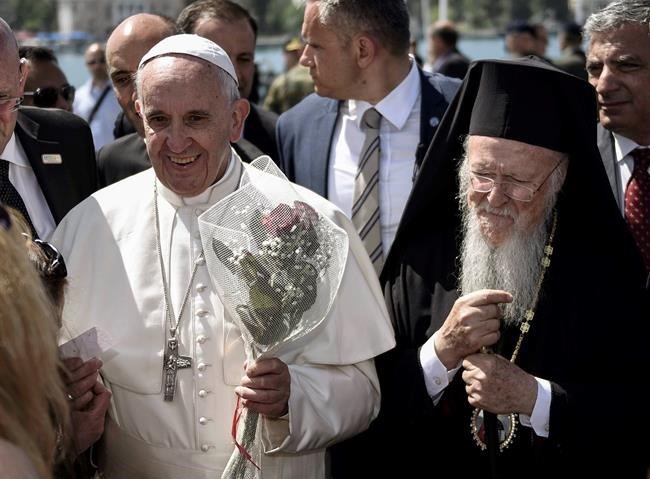
FILE - In this file photo dated Saturday, April 16, 2016, released by Greek Prime Minister's office, Pope Francis, left, is escorted by Ecumenical Patriarch Bartholomew I, during a visit to the Greek island of Lesbos. On Friday June 3, 2016, the Orthodox Church led by Patriarch Bartholomew I, issued a call for the faith's 14 independent churches to discuss their common future and efforts to heal the nearly 1,000-year rift with the Roman Catholic church. All the Orthodox churches are scheduled to meet later June, in Crete, Greece. (Andrea Bonetti/Greek Prime Minister's Office via AP, FILE)
Republished June 03, 2016 - 6:30 AM
Original Publication Date June 03, 2016 - 4:45 AM
CAIRO - The spiritual seat of the world's Orthodox Christians on Friday issued a call for unity ahead of the first ever meeting of the faith's 14 independent churches that is expected to discuss the churches' common future and efforts to heal the nearly 1,000-year rift with the Roman Catholics.
The meeting later this month in Crete will be convened by Ecumenical Patriarch Bartholomew I, the Istanbul-based spiritual leader of the world's 300 million Orthodox Christians.
All the Orthodox churches, old and new that emerged over the centuries, have never met like this before — not since the "great schism" of 1054, when the Orthodox and Roman Catholics split after disputes over the Vatican's power.
The Ecumenical Patriarchate, which is also based in Istanbul, said the "Holy and Great Council is a unique and historical occasion." Preparations for the meeting have been underway since 1961, when the planning first began.
Bartholomew's spokesman, the Rev. John Chryssavgis, told The Associated Press that the June 19-26 gathering's "sole purpose is the affirmation of unity."
"Unity is a slow and painful process. We don't have to be united on every point to convene the council; but we do have to convene the council if we aspire to unity," Chryssavgis said.
The call followed reports that the Bulgarian Orthodox Church, which is due to come to Crete, had threatened to pull out, reportedly asking for some mostly procedural changes to the agenda. It did not say what changes it was requesting or if it would carry out the threat.
Chryssavgis said that "after centuries of isolation, occupation, and persecution," it won't be easy for the churches to come together.
"It is very natural, then, for some Churches to feel unsure or uncomfortable about coming together after such a long time, much like members of a family might be skeptical and even mistrustful after a long period of separation," he said.
Unlike the Roman Catholics, the Orthodox churches are independent and have their own leadership. For example, Patriarch Kirill of Moscow is head of the world's largest Orthodox Church, but is considered equal to other patriarchs.
Bartholomew is called the "first among equals," but leads a smaller flock than Kirill.
Since the "great schism" there have been about a dozen smaller Orthodox councils over the centuries to discuss theological or doctrinal issues, but there has never been a meeting on the scale of the Holy and Great Council.
The Crete council will discuss the mission and role of the Orthodox Church and its global flock, issues relating to the function of the churches and its relations with other Christian faiths. Unity of the Orthodox churches is considered a key prerequisite to any reconciliation with the Vatican.
"Our focus should be on the objective of unity," Chryssavgis said.
News from © The Associated Press, 2016